New honors for Speranza Scappucci

See the bottom of this post for the great news!
We interviewed conductor Speranza Scappuccci last year shortly after we met her in Washington DC and learned that she will be appearing at the Rossini Opera Festival this summer. Since then she has been busy with performances throughout the world. Her recent performances in US included a much praised “La Sonnambula” which prompted the NYTimes music critic to suggest that it was time for her to “conduct across 65th street at the Met”!
Her most recent US performances were at LA Opera where she revitalized the musical values in the warhorse, La Boehme While at LA Opera, Scappucci was interviewed at length for KUSC and we posted the link to that interview.
In spite of her busy schedule, she has graciously agreed to answer a few more questions for RossiniAmerica, to update her previous interview.
Q. Thank you for again taking time to answer our questions. We are sorry we don’t ( yet) have the technical capability of bringing audio interview here on the site; It is one thing to see your responses “on paper”, quite another to hear you speak with such passion and commitment about your work.
Q. Recently some pages of a Rossini manuscript ( if one can call them that) were posted on FB and they looked like what one commentator called a Rorschach test. They were at least quite frantic and messy. When you study his printed scores do you feel the sense of spontaneity that the listener feels, or is this something that you must “create”?
A. Rossini wrote his operas is very short periods of time ! His genius and creativity are without limit. At the same time I think nothing is left to pure chance with him. To the listener his music of course sounds spontaneous and perfectly balanced, but I am sure that in certain masterpieces although Rossini uses some “formulas” , everything is perfectly planned out and the balance and perfection between word and music is spectacular !
Q. In your comments for the LA Opera interview you mentioned something about “young voices” being ideal for La Boheme. How much does the quality of the voice ( not the technique) matter in a Rossini Opera?
A. What I meant in Puccin’s La Boheme was not young voices necessarily , but youthful characters ! Because it’s an opera about youth,love, life and loss of innocence, sudden death. Because of Puccinis orchestration it is the conductors duty to make sure that the transparency of the heavy orchestration never surpasses the voices. You need healthy voices for Puccini. Same of course for Rossini , for which vocally speaking, it is necessary to have some qualities like coloratura and good legato
Q. We first became aware of your work from the enthusiastic review of your performances of “Il Turco in Italia” at Julliard a number of years ago. You are returning to this work for your Pesaro debut. You frequently say that you start with the score ( to find the “truth behind the notes”, if we recall) what is it like to return to a score that you have already conducted? Is there always something new to discover? How do your previous performances inform the ones you are presently doing?
A. Sudying a score always presents the opportunity to discover new things ! In this edition of Turco in Italia there will be practically no cuts , so some new music for me compared to the Juilliard version . Also I will be dealing with new singers so of course it’s a great opportunity to do things differently !
Q. A well respected American music critic recently bemoaned the quality of the present crop of young American conductors. One of his observations was that they are not mentored, and few, if any, come from a background in opera. Most of the great conductors we can think of did have a background in opera. What role has working with singers have in shaping you as a conductor?
A. For me it was fundamental. Because understanding how the human voice works and coaching singers gives me a more wide spectrum of how music phrasing goes! And it can be applied to phrasing also in the symphonic repertoire . People tend to think that if a conductor comes from opera , they are probably not as great in symphonic repertoire ! I say it’s quite the contrary . If you are able to deal with the stage the singers the chorus etc etc , it is quite likely that working on symphonic repertoire is as good or even “easier” ! Working backstage for years , training singers, next to great conductors can be the best school for a conductor in the making. That is , of course , if there is a basic talent and charisma.
Q. Is there anything you would like to convey to our Festival goers before we all meet in Pesaro?
A. I hope you will all enjoy this Turco in Italia, a real masterpiece of Rossini , often underestimated
Again, thank you for taking the time to answer these questions.
Photo credit : Marco Borrelli
After her Pesaro debut in “Il Turco in Italia”, Speranza Scappucci most recently appeared in Vienna ( conducting Rossini) where she was given this well-deserved, fantastic honor!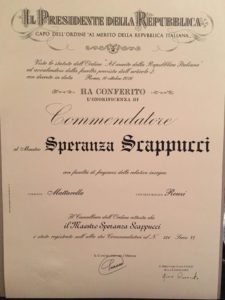
From the May 2016 Newsletter from ROF
FINAL WEEKS FOR THE CONTEST “IL TUO VIAGGIO”
Just three weeks left to join the fourth edition of Il tuo Viaggio, a contest aiming to award a prize to a new talent in the field of graphics by publishing the winner’s work as the front cover of the programme of the opera Il viaggio a Reims at the Rossini Opera Festival 2016.
Up to the 20th June applications can be made online by filling in the relative form. Designs must be submitted in the jpg format, cmyk mode, low resolution. Participants in the competition may submit more than one design. The winner will receive two free tickets for the opera.
THE RETURN OF CIRO IN BABILONIA
The revival of Ciro in Babilonia, first heard in the successful revival of 2012, will be the occasion for the return to Pesaro of Ewa Podles, the charismatic contralto around whom Davide Livermore had arranged his staging. The irreplaceable protagonist will be supported by such artists worthy of her as Pretty Yende and Antonino Siragusa. The Chorus and Orchestra of the Teatro Comunale, Bologna will be conducted by Jader Bignamini, one of the leading and most interesting conductors of the younger generation.
The production of Ciro in Babilonia, which was based upon the spectacle typical of silent films, was unanimously praised four years ago, and won the Abbiati prize for Gianluca Falaschi’s costumes.
Rene Barbera is returning to ROF this summer!
After a triumphant debut in last summer’s Festival ( his performance in Stabat Mater was particularly moving) Rene will be returning to ROF to star in “Il Turco in Italia” under the baton on Speranza Scappucci, and in a new production by Davide Livermore.
Be sure to read our interview with Rene, made before his ROF debut.
Wise words from our conductor making her ROF debut this summer!
This clip is about half and hour long. The interview is related to her appearance at LA Opera in Puccini, but much of what she says about preparation applies to Rossini as well.
Hope it works! Enjoy!
Rossini here, Rossini there
From Houston to the Bronx, small opera companies are presenting Rossini this month!
The Bronx Opera, which celebrates its 49th birthday, has two more performances of “Cenerentola” May 7 and 8th. Looks like a great opportunity to introduce young people to opera. More information at www.bronxopera.org.
Then there is Operativo Houston, which is presenting “La cambiale di matrimonio” on May 14th. For more information see www.operativohouston.com
The artists and everyone involved are clearly doing this because they love Rossini. We wish them good luck and full houses!
Remembering a joyous moment at ROF
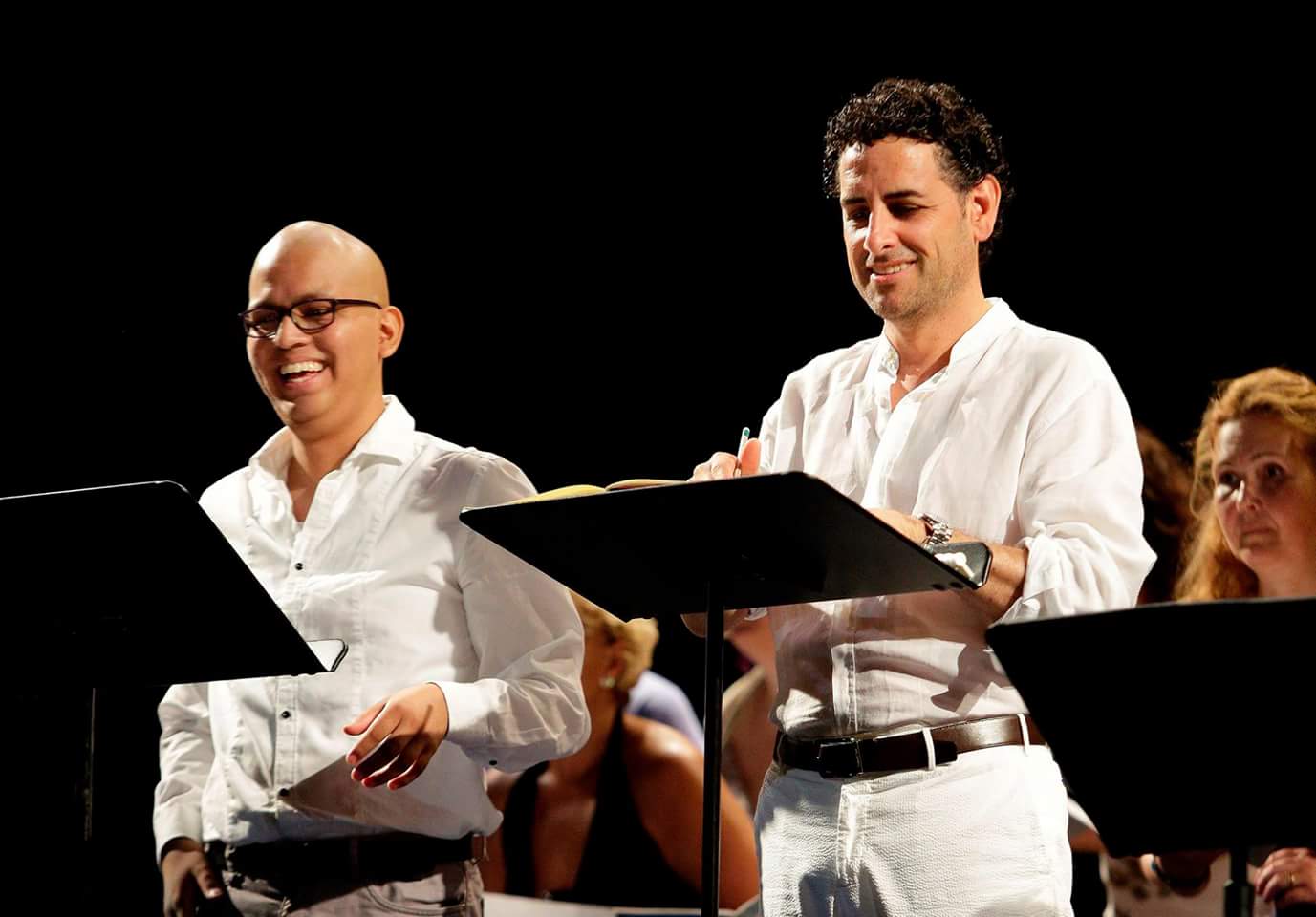
The news of the loss of Dempsey Rivera spread throughout social media recently. A much-loved young talent who first appeared at the Rossini Opera Festival as a member of the Accademia Rossiniana, Dempsey returned to appear in Aureliano in Palmyira the following year. Last summer he appeared in Messa di Gloria ( seen here with Juan Diego Florez). Most likely many in the audience didn’t know of Dempsey’s illness and treatment; his bravery and determination in sharing his talent now seems bitter-sweet. Thanks to ROF for providing this beautiful photograph. And condolences to Dempsey’s friends,colleagues,and family.
Extending the heritage of Alberto Zedda in Canada
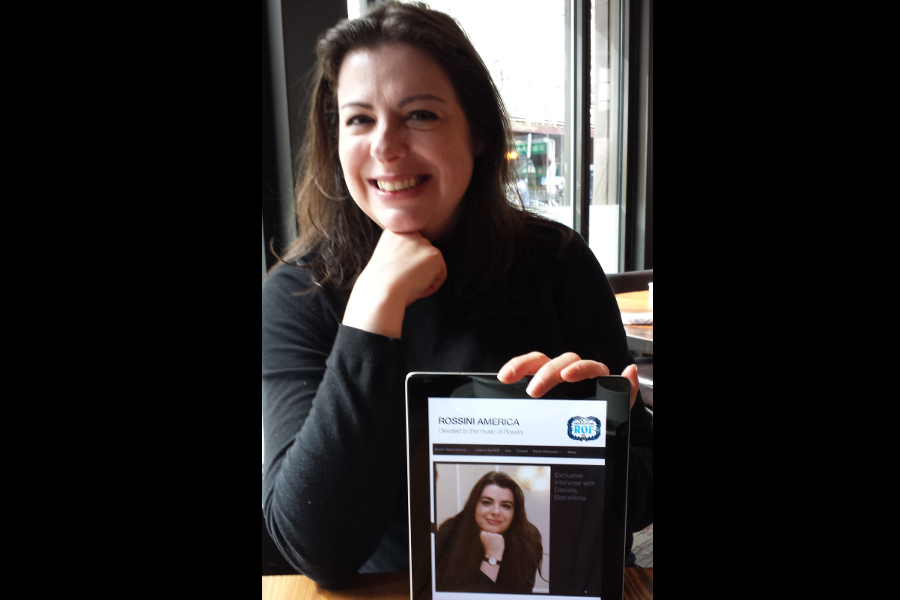
Fresh from a triumphant concert at La Scala, Daniela Barcellona accompanied by her husband, Alesandro Vitiello, arrived in Lunenburg,Canada,to continue the work begun by the late Alberto Zedda at the Rossini Opera Academy.
Zedda had hoped that the enterprise started by him and others 4 years ago would flourish and spread throughout North America.
Lunenburg is fortunate to have Daniela, herself a graduate of the Accademia Rossiniana in Pesaro, Italy, maintain Zedda’s knowledge,passion, and dedication to guiding the next generation of Rossini singers.
Read our interview with Daniela elsewhere on this site.
In grateful memory: Sir Peter Moores
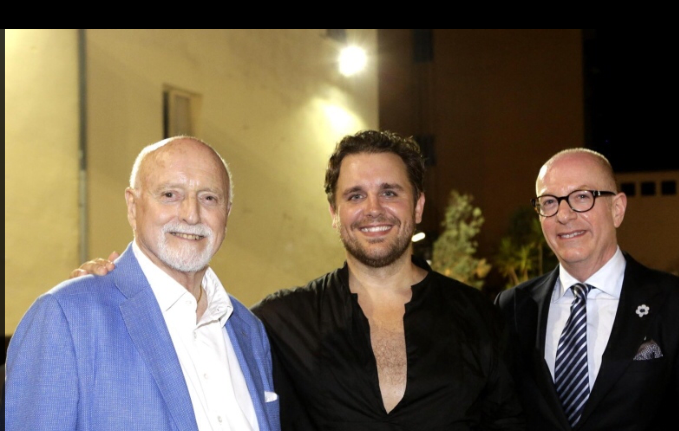
Some may not know the name Sir Peter Moores. But anyone who loves bel canto opera, and Rossini in particular owes him a debt of gratitude. Sir Peter through his foundation helped establish ( and continued to support) Opera Rara which has brought works that were less well known to a broad audience.
The support of the Sir Peter Moores Foundation for the Rossini Opera Festival, in particular the Accademia Rossiniana has been so critical in grooming the next generation of Rossini singers.
In addition to the financial support, Sir Peter clearly loved being in Pesaro for the Festival where many “ordinary” Festival goers had a chance to meet him.
In the picture Sir Peter is pictured at a dinner following “Aureliano in Palmyra” at the Rossini Opera Festival in 2014. He is pictured with Michael Spyres ( who sang Aureliano and will be appearing again at ROF2016) and Gary Gordon from the board of the Friends of the Rossini Opera Festival. The picture taken by Luigi Diolvei appeared in the on-line IlRestodeCarolino.it.
Michael Spyres mentioned on that occasion that Opera Rara had played an important part in his pursuing the repertory that he now excels at. A wonderful memory.
Sir Peter wrote an introduction to the book ” Accademia Rossiniana XXV, una storia” which was published by ROF in 2013 in which he makes the case for the ROF in general and the Accademia in particular. It appears in Italian in the book, but below is the original English from which it was translate
May 2013
Opera Festival – Pesaro
Most of those reading this programme won’t remember the operatic repertoire of the middle fifties. Do you know how many of Rossini’s operas you could see? One! Il Barbiere or perhaps two? L’Italiana in Algeri. Rossini had led a fashion in Paris for Grand Opera, which naturally were Opere Serie and this fashion produced voices and grew from Lirico Leggiero, to Lirico, to Lirico Spinto and on to Dramatisch and Hoch Dramatisch leading bel canto into CAN BELTO. Rosina had to sing Amneris. This in turn led to larger and larger houses and heavier repertoire.
The establishment of speciality Summer Festivals in the last century saw the founding of Pesaro’s Festival and (not forgetting Bayreuth) others of which Pesaro had the most radical result. Pesaro revived operas by Rossini unheard for years. These almost always involved revision in length and depth of the score(s) – and sometimes there were a variety of scores. Rossini himself had often been present for these revisions – revivifications – and lengthened or shortened the score, rewriting or replacing arias and duets for the second performances. What scores remain to us are not always in Rossini’s own hand, so questions of editorship arise, especially as the revification in question may not have brought a successful revival and so could peter out after one or two performances, leaving the world without a final approved author’s score.
Rossini Opera Festival under the leadership of Gianfranco Mariotti and Alberto Zedda has proved itself well able to cope with the adventurous path they had chosen, building not only a larger and larger Rossini repertoire there, but also first refining a musical and vocal style, which would sustain this, and training and raising musicians – not just singers – in such style as to act as a model and example to other careful musical festivals and then to repertoire Houses seeking to extend their annual repertory chosen from three Verdis, three Puccinis, Carmen, Faust and Don Giovanni.
Pesaro has also kept where it is not only by judging its music and its behaviour with a self-critical eye, but making sure to keep itself in funds – nowadays a very important part of running an Opera House. The thoughtful relaxed and friendly atmosphere of the staff, the artists, and the town itself have made us all want not only to be regular visitors each year, but to put as much help and financial support into helping Pesaro as we can each possibly manage.
Celebrate Rossini’s birthday in NYC, Chicago, and LA
The Rossini Opera Festival is bringing the festivities to lucky Americans living in NYC, Chicago, and LA.
Read about it here:
http://www.rossinioperafestival.it/?IDC=530&ID=713
If you can’t be there in person, you can at least join the world-wide Rossini celebrations by listening to him in your home ( make the neighbors happy – turn up the volume), car ( don’t run red lights!) , jogging ( be careful) Viva Rossini!!!!
In honor of Rossini’s birthday!
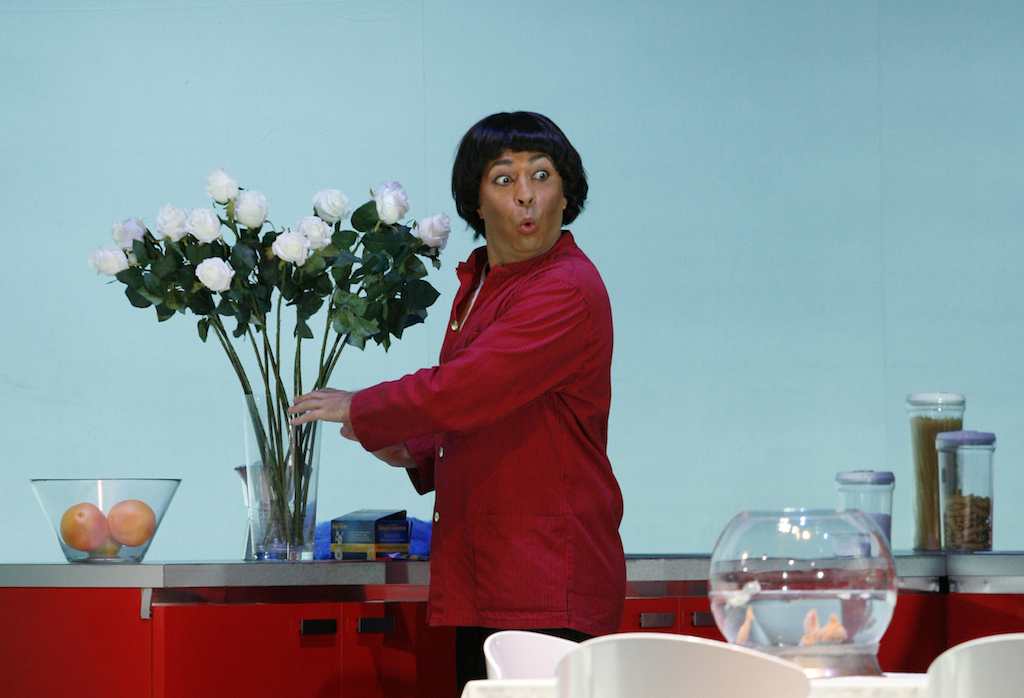
We are reposting this in honor of Rossini’s birthday!
We’re also including a picture of Paolo in one of our favorite roles ( he almost “owns it”)
Below is our interview with Paolo Bordogna who graciously agreed to answer our questions while in the middle of his run of performances in Il Barbiere di Siviglia at the Opèra Bastille in Paris.
His answers appear in the original Italian, followed by a rough translation.
Q. You are a “graduate” of the Accademia Rossiniana (1998 I believe) what
was the experience like for you then, and what do you feel about it today?
A. E’ stato molto tempo fa, era molto bello confrontarsi con altri giovani
artisti sul linguaggio musicale di Rossini. Fin da subito potevi capire chi era
in grado di cogliere lo spirito “rossiniano” e chi invece era li per fare un’
Accademia che avrebbe potuto portargli una “vetrina” in più per farsi notare…il
tempo e lo studio sono “galantuomini” e prima o poi portano alla “verità”. La
prima vera Accademia la si fa con noi stessi, quando ci mettiamo di fronte ad
un capolavoro che dobbiamo saper leggere, analizzare e poi interpretare. Per
far questo si ha bisogno di tecnica, tenacia e umiltà, sempre!
Yes, it was a long time ago. It was such a joy to confront oneself with other young singers on the musical language of Rossini. From the very start you could tell who was capable of catching the “Rossinian” spirit, against those who where there only to use the Accademia as a show case to be noticed… Time and study are “gentlemen” and will eventually tell the “truth”.
The first real Accademia is the one we do with ourselves, when we confront a masterpiece that we have to learn to read, analyze and perform. To achieve this we need technical skills, persistence and humility, always!
Q. You have been a mainstay of many ROF performances. We won’t ask
you about which one you like best, but if you have a favorite, please tell
us!!
A. Ho cantato al ROF dal 2005 al 2014, (questa estate!). Tra le mie opere
preferite di Rossini c’è senza dubbio Cenerentola, ma nel mio cuore resterà
sempre il dolce Germano della Scala di Seta, che ho cantato in tanti altri
teatri, anche alla Scala di MIlano.
Sono molto legato a quest’opera perchè ho partecipato in prima persona all’
idea registica di questo personaggio con Damiano Michieletto. Io continuavo a
domandarmi come fosse possible che un personaggio definito “sciocco” da Rossini
stesso ad un certo punto dell’opera cantasse una delle arie più difficili e
allo stesso tempo meravigliose che Rossini abbia mai scritto per un buffo? Un’
aria che parla d’amore, con frasi lunghissime ed eteree, da far invidia a
qualsiasi “tenore larmoyante” e romantico? Doveva esserci un motivo a tutti
“misunderstanding” che si creano nella trama, che non fosse semplicemente colpa
della sua sciocchezza! Un’idea di “buffo moderno” deve togliere tutte le
“croste” del passato su questi personaggi che altrimenti risultano sempre
grotteschi, esagerati nella recitazione, e dalla mano pesante sulle caccole
dalla risata facile. La mia idea di comicità si ispira a Chaplin, a Totò, a
Jack Lemmon, ad Alberto Sordi o a Walter Matthau.
Così chiesi al regista che per favore non si fermasse all’aspetto “esteriore”
e semplicistico della “stupidità” di Germano, ma che mi aiutasse a trovare un
motivo per cui Germano non capisce mai le cose che gli si dicono, creando tutta
quella serie di malintesi che danno poi vita alla farsa. Fu così che decidemmo
di farlo “straniero”, e trasformammo il “servo sciocco” della farsa del primo
‘800 in un modermo “butler” di orginine orientale in un moderno loft di Parigi.
Cosi erano la lingua e la diversità culturale a creare problemi, non la
stupidità!
Il personaggio lasciò un segno incredibile sul pubblico, moltissimi lo
amarono, molte signore mi fermavano per strada chiedendomi di andare a casa
loro a stirare. Perchè proprio il momento più toccante di Germano è quando
canta l’aria “amore dolcemente”, e nella nostra produzione, lo facevo stirando
e guardando la TV…da solo, io e un piccolo pesce rosso nel suo piccolo
acquario. Una condizione di estrema solitudine che molte donne avranno provato
facendo le faccende domestiche ma anche molti immigrati in terra straniera.
Sentivo che, nel mio piccolo, stavo dando un segnale “sociale”: chi sembra
diverso da noi non va mai escluso, va compreso e amato proprio perchè
“diverso”!
I sang at ROF from 2005-2014 ( this summer!) . Rossini’s opera, “La Cenerentola” is without a doubt my favorite, but the sweet Germano from “La Scala di Seta” will always be in my heart. I’ve sung it at many theaters, including La Scala in Milan.
I’m very attached to this opera because I participated personally in the creation of this character along with Damiano Michieletto ( the director of the ROF production). I kept wondering how it was possible that a character called “silly” by Rossini himself at one point could sing one of the most difficult and at the same time beautiful arias that Rossini had ever written for a “buffo”. An aria that speaks of love with long an ethereal phrases, that would be the envy of any romantic tenor?
There had to be a reason for the “misunderstandings”that created the plot, it could not simply be the fault of the “silly character”. The idea of a modern “buffo” which would remove all the “scabs” of the past of these characters that otherwise have grotesque, exaggerated acting and heavy-handed boogers resulting in an “easy laugh”. My idea of comedy is inspired by Chaplin,Toto,Jack Lemmon,Alberto Sordi and Walter Matthau.
So I asked the director not to be limited to the “external” and simplistic “stupidity” of Germano, but to help me find the reason why Germano never understands things that said and as a result creates the series of misunderstandings that give life to the farsa. So we decided to make him a “foreigner” and transformed the “foolish servant” of the farsa of the 1800’s to a modern butler of oriental origin in a modern Parisian loft. That way it was the language and the cultural differences that created the problems, not the “stupidity”
The character left an incredible mark on the audience. Many loved it. Many women stopped me in the street asking me to come home with them to do their ironing ( ed note. One really has to see this production to appreciate this comment – fortunately it is commercially available on DVD) Because the most touching moment is when Germano sings the aria “Amore dolcemente”, and in our production is ironing while watching TV. – alone. Me and a small goldfish in his small aquarium. A condition of extreme loneliness that many women have experienced doing household chores – but also many immigrants in a foreign land. I felt that I was making a point about society: he who seems “different” should never be excluded, but should be understood and loved for being “different”.
Q. Your performance in Matilde di Shabran was a tour de force –
particularly with all that Neapolitan dialect. I remember Italians in the
audience being quite impressed. Was it particularly difficult to sing this
role because of the language?
A.Oh, non per me! La mia famiglia è per metà napoletana, io parlavo il dialetto
napoletano con mia nonna Rosa e mio nonno Vitantonio! E badate, il dialetto che
parlavo con mia nonna già non esiste più. Il dialetto moderno napoletano è
molto cambiato. Perciò quando ho cominciato a studiare la Matilde ho ritrovato
molti termini del dialetto antico che parlavo con i miei nonni.
La cosa che mi stupisce e che tutti notarono questa cosa del dialetto e
nessuno si è accorto che ho cantato più sol acuti che in una cavatina di Figaro
del barbiere di Siviglia!! (meglio così, se l’ascolto è “facile” vuol dire che
il “cantato” è ben fatto!)
Oh, not for me! My family is half Neapolitan. I spoke the Neapolitan dialect with my grandmother Rosa and my grandfather Vitantoni! And mind you the dialect I spoke with my grandmother no longer exists. The modern Neapolitan dialect has changed a lot. So when I began to study “Matilde” I found many terms in the ancient dialect I spoke with my grandparents. The thing that amazes me is that nobody noticed that I sang more high G than in a single aria of Figaro in the “Barber of Seville”!! Just as well – if the listening is “easy” it means that “singing” is well done!
Q. Last summer’s “Barbiere” was in collaboration with the “Accademia di
Belle Arti di Urbino”. What was it like to work with all those enthusiastic
young people?
A. La cosa più bella e che mi fece commuovere fu che tutti questi giovanissimi
scenografi, per fare questo lavoro avevano imparato a memoria il barbiere e lo
cantavano sempre nelle pause, per le scale, nelle strade…!!
The most beautiful thing and the thing that moved me was that all these young designers in order to do this work, had memorized “Il Barbiere “ and always sang during breaks, on the stairs, in the streets!!!
Q. Your performance as “Mama” in “Le convenience ed inconvenience
teatrali” by Donizetti is unforgettable. Thank goodness it is on DVD. Can
you explain to people who know nothing of singing how different it is to
sing Donizetti and Rossini?
A. Uno dei ruoli più divertenti che abbia mai cantato e che mi ha dato anche la
possibilità di fare un vero balletto classico sulle punte!! Adoro le sfide! E
non vedo l’ora di poter rifare questo ruolo. Il prossimo appuntamento è al
Maggio Musicale Fiorentino l’anno prossimo!
Donizetti ha in genere un’orchestrazione più ampia, ma sostanzialmente lo
stile, dal punto di vista vocale è molto simile. Entrambi sono portatori sani
di “belcantismo” e fanno bene alle voce! Ci sono poi differenze sullo stile
delle cadenze per esempio o su come affrontare una variazione, o sulla
diversità di “staccato”, ma rischierei di essere troppo tecnico e non voglio
annoiarvi!
It’s one of the most fun roles I’ve ever sung and it also gave me the opportunity to dance true ballet on pointe! I love challenges! I cannot wait to be able to redo this role. The next time will be at the Maggio Musicale Fiorentino next year!
Donizetti’s orchestration is typically larger, but essentially the style, from the point of view of the voice is very similar. Both are true embodiments of “bel canto” and are good for the voice. There are also differences in style – cadenzas, for example, or how to approach variations, and differences in “staccato”, but I risk being too technical and I do not want to be a bore.
Q. Finally, we understand that you are coming to the US! Please tell us more!
A. Si, sono così felice! Debutterò alla Washington National Opera il prossimo
maggio 2015 con Cenerentola!! E vi posso anche anticipare che per allora sarà
pronto il mio primo CD solistico di arie d’opera che ho appena inciso con
Decca. Nel disco ci saranno tutti mi miei amati personaggi, da don Magnifico a
Mamma Agata, da Beaupertuis a Gianni Schicchi…e molte sorprese!
Yes, with pleasure. I will debut at the Washington National Opera in May 2015 with “Cenerentola” And I also expect that at that time my first solo CD of opera arias with Decca will be ready. It will feature all my beloved characters, from Don Magnifico to Mamma Agata, from Beaupertuis to Gianni Schicchi.. and many surprises.
We thank Paolo Bordogna for this interview and invite you to visit his website,www.paolobordogna.eu. Follow him on Twitter @BordognaPaolo and visit him on Facebook.
